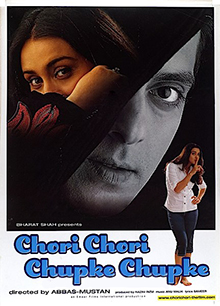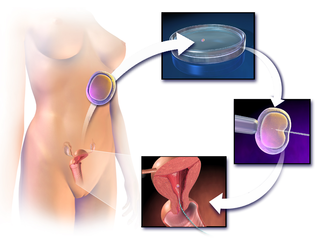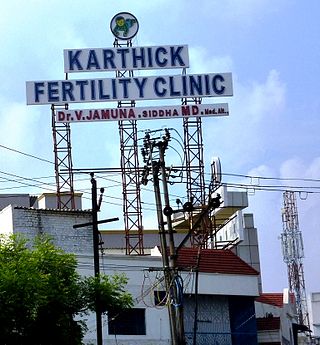
In vitro fertilisation (IVF) is a process of fertilisation in which an egg is combined with sperm in vitro. The process involves monitoring and stimulating a woman's ovulatory process, then removing an ovum or ova from her ovaries and enabling a man's sperm to fertilise them in a culture medium in a laboratory. After a fertilised egg (zygote) undergoes embryo culture for 2–6 days, it is transferred by catheter into the uterus, with the intention of establishing a successful pregnancy.

Infertility is the inability of a couple to reproduce by natural means. It is usually not the natural state of a healthy adult. Exceptions include children who have not undergone puberty, which is the body's start of reproductive capacity. It is also a normal state in women after menopause.

Artificial insemination is the deliberate introduction of sperm into a female's cervix or uterine cavity for the purpose of achieving a pregnancy through in vivo fertilization by means other than sexual intercourse. It is a fertility treatment for humans, and is a common practice in animal breeding, including dairy cattle and pigs.
Baby M was the pseudonym used in the case In re Baby M, 537 A.2d 1227, 109 N.J. 396 for the infant whose legal parentage was in question.

Family planning is the consideration of the number of children a person wishes to have, including the choice to have no children, and the age at which they wish to have them. Things that may play a role on family planning decisions include marital situation, career or work considerations, financial situations. If sexually active, family planning may involve the use of contraception and other techniques to control the timing of reproduction.

Chori Chori Chupke Chupke is a 2001 Indian Hindi-language romantic drama film directed by Abbas–Mustan, with screenplay and story from Javed Siddiqui and Neeraj Vora respectively. Starring Salman Khan, Rani Mukerji and Preity Zinta in lead roles, the film's music is composed by Anu Malik and lyrics are penned by Sameer. Telling the story of a married couple hiring a young prostitute as a surrogate mother, the film generated controversy during its release for dealing with the taboo issue of surrogate childbirth in India.

Assisted reproductive technology (ART) includes medical procedures used primarily to address infertility. This subject involves procedures such as in vitro fertilization (IVF), intracytoplasmic sperm injection (ICSI), cryopreservation of gametes or embryos, and/or the use of fertility medication. When used to address infertility, ART may also be referred to as fertility treatment. ART mainly belongs to the field of reproductive endocrinology and infertility. Some forms of ART may be used with regard to fertile couples for genetic purpose. ART may also be used in surrogacy arrangements, although not all surrogacy arrangements involve ART. The existence of sterility will not always require ART to be the first option to consider, as there are occasions when its cause is a mild disorder that can be solved with more conventional treatments or with behaviors based on promoting health and reproductive habits.

Surrogacy is an arrangement, often supported by a legal agreement, whereby a woman agrees to childbirth on behalf of another person(s) who will become the child's parent(s) after birth. People pursue surrogacy for a variety of reasons such as infertility, dangers or undesirable factors of pregnancy, or when pregnancy is a medical impossibility.

A crisis pregnancy center (CPC), sometimes called a pregnancy resource center (PRC) or a pro-life pregnancy center, is a type of nonprofit organization established by anti-abortion groups primarily to persuade pregnant women not to have an abortion.

Fertility clinics are medical clinics that assist couples, and sometimes individuals, who want to become parents but for medical reasons have been unable to achieve this goal via the natural course. Clinics apply a number of diagnosis tests and sometimes very advanced medical treatments to achieve conceptions and pregnancies.
A uterine transplant is a surgical procedure whereby a healthy uterus is transplanted into an organism of which the uterus is absent or diseased. As part of normal mammalian sexual reproduction, a diseased or absent uterus does not allow normal embryonic implantation, effectively rendering the female infertile. This phenomenon is known as absolute uterine factor infertility (AUFI). Uterine transplant is a potential treatment for this form of infertility.
Fertility tourism is the practice of traveling to another country or jurisdiction for fertility treatment, and may be regarded as a form of medical tourism. A person who can become pregnant is considered to have fertility issues if they are unable to have a clinical pregnancy after 12 months of unprotected intercourse. Infertility, or the inability to get pregnant, affects about 8-12% of couples looking to conceive or 186 million people globally. In some places, rates of infertility surpass the global average and can go up to 30% depending on the country. Areas with lack of resources, such as assisted reproductive technologies (ARTs), tend to correlate with the highest rates of infertility.
Sperm donation is the provision by a man of his sperm with the intention that it be used in the artificial insemination or other "fertility treatment" of one or more women who are not his sexual partners in order that they may become pregnant by him. Where pregnancies go to full term, the sperm donor will be the biological father of every baby born from his donations. The man is known as a sperm donor and the sperm he provides is known as "donor sperm" because the intention is that the man will give up all legal rights to any child produced from his sperm, and will not be the legal father. Sperm donation may also be known as "semen donation".
Surrogacy in India and Indian surrogates became increasingly popular amongst intended parents in industrialised nations because of the relatively low costs and easy access offered by Indian surrogacy agencies. Clinics charged patients between $10,000 and $28,000 for the complete package, including fertilization, the surrogate's fee, and delivery of the baby at a hospital. Including the costs of flight tickets, medical procedures and hotels, this represented roughly a third of the price of the procedure in the UK and a fifth of that in the US. Surrogate mothers received medical, nutritional and overall health care through surrogacy agreements.
An ova bank, or cryobank, or egg cell bank is a facility that collects and stores human ova, mainly from ova donors, primarily for the purpose of achieving pregnancies of either the donor, at a later time, or through third party reproduction, notably by artificial insemination. Ova donated in this way are known as donor ova.
The Akanksha Infertility Clinic is a women's health centre located in Anand, Gujarat, India, and headed by Dr Nayna Patel. The clinic was founded in 1999, and was originally focused on In Vitro Fertilization. India declared commercial surrogacy legal in 2002; however the clinic did not begin to do surrogacy until 2004. Patel, who appeared on Oprah Winfrey's talk show in 2007, has produced more than 1000 surrogate babies as of October 2015.
Bavishi Fertility Institute is an India based centre for the treatment of infertility and care. The hospital specialises in vitro fertilisation (IVF) and surrogacy. The institute is located in five cities Ahmedabad, Surat, Mumbai, Delhi and Kolkata.

Motherhood Hospitals by Rhea Healthcare is a specialty hospital chain offering maternity, children, and fertility healthcare services. Headquartered in Bengaluru, India, it was founded by Dr. Mohammed Rehan Sayeed, a cardiothoracic surgeon. Motherhood has 20+ hospitals and clinics in Bengaluru, Mysore, Chennai, Coimbatore, Pune, Mumbai, Chandigarh, Gurgaon, Indore and Noida. They provide gynaecology and pediatrics care services.
Duru Shah is a Mumbai-based gynaecologist academic and women activist. She is the Founder President of the PCOS Society, India and a promoter of adolescent girls and women's health and infertility in India. Shah is also the promoter of Metropolis Healthcare Ltd. She is also a Consultant ObGyn.: Breach Candy Hospital, Jaslok Hospital, Mumbai.

Nandita P. Palshetkar is an Indian Gynecologist who specializes in in vitro fertilisation and infertility. She is the elected president of Federation of Obstetric and Gynaecological Societies of India, in 2019. She is also the first vice president of Federation of Obstetric and Gynaecological Societies of India.











